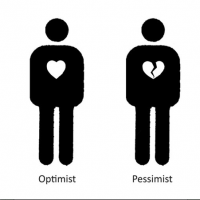
Over- and Underestimation
 A new column has appeared! The topic is “chess and psychology” and the author-- me. Why this topic? Well, I noticed that most of the other columns deal with strictly chess factors – analysis of this opening line, this endgame, what kind of plan to use in this typical position. This is very important, of course, but remember – no matter how much people might try to convince you that modern chess is a game of very accurate analysis, it will always be a battle between two human beings. Humans might be very smart animals, but they are still animals, ruled by emotion.
A new column has appeared! The topic is “chess and psychology” and the author-- me. Why this topic? Well, I noticed that most of the other columns deal with strictly chess factors – analysis of this opening line, this endgame, what kind of plan to use in this typical position. This is very important, of course, but remember – no matter how much people might try to convince you that modern chess is a game of very accurate analysis, it will always be a battle between two human beings. Humans might be very smart animals, but they are still animals, ruled by emotion.
I haven’t studied much psychology, so I wonder if I was really the right person to write this column. Nevertheless, I have been playing chess for quite a while, and can give some insight into the psychology of chess play. Not, of course, on a scholarly level; but rather, on a practical one. So, we will be looking at the psychological genesis of chess errors. No, there will be no Freudian analysis, I promise you…
In this first article, I will look at one of the most decisive factors in “chess psychology”. This is how one estimates one’s position. You are fooling yourself if you think you, or anyone else, can make a really accurate assessment of a complicated middlegame position. At best it is an inexact science. Do not forget that we humans can really only see part of the board at a time! Our assessments are based on our gut feelings, our experience, and to a great degree, on our emotion. Yet, our assessment of the position plays a huge role in how we play it!
A couple months ago I had the only really bad tournament I played this year, the Karpos open in Skopje, Macedonia. Before that tournament, I had been winning everything; but this tournament was not going my way. Earlier in the tournament I had drawn from a couple winning positions, and this had been frustrating. The danger signs should have been visible as early as round 2:
WGM Stojanovic told me she intended to resign immediately if I played 26.h6. In assessing the position as winning, I was not incorrect. But I still overestimated my position! You can overestimate a winning position too. You can overestimate how winning it is. You see, I felt that I could win any way I wanted to. But in fact, the careless 18.Qd6 (refusing to even calculate several easily winning variations, because I felt they were not enough) forced me to find the accurate 26.h6. And at that moment I was extremely careless. After missing 26.h6, my opponent skillfully defended, despite her time pressure.
Strangely enough, an unpleasant turn like this doesn’t necessarily pull you back to reality. As it so happened, nearly the same thing happened in the next round! As the tournament went on, since I did not have so many points, I was playing lower-rated players constantly. And the string of draws was making me frustrated, causing my evaluations of the position on the board to go completely out of control. Soon, it seemed that defeating someone rated 200 points less than myself was a monumental task. As it should be – because I was putting the onus on myself to “win” the game, rather than to just play. To go along with this psychological error was the assumption that any achievement I might make in the game (including a move from my opponent that looks erroneous to me, or the achievement of a “promising position”) should be decisive. Finally I won a game, with great help from my opponent, which managed to override my skewed viewpoint:
In the following game I managed to defeat IM Vasovski very luckily. Again the problems continued, although the tournament was almost over. I will spare you this terrible game, which started out promising for me, causing me to make some rather spastic moves, reign myself in a little, obtain a winning endgame after a blunder from my opponent, overestimate this winning endgame (expecting resignation at any moment, rather than a tough resistance), and throw away the win finally by avoiding a safe and easy line. Finally, once I had given up the game as a draw, my opponent made a shocking blunder, held his head in his hands for five minutes, and then resigned…only to immediately show me how after his correct move, because of some little tactical point the game would not be a draw – I would actually lose!
While analyzing the game afterwards, I said to IM Goran Vojinovic, who I knew from back in the U.S. “I am playing so terribly.” To which he replied very wisely “No, you are not playing badly, but your problem is you think you are winning from the first few moves.” And I realized this was quite true. No wonder he is known as a good trainer! Assessing a position as "winning" is a very dangerous thing indeed.
As it turned out, I played against him in the next – the last – round. I had black, and although a win would give some small prize, I didn’t think there was much chance of that happening, so I offered him a draw. It turned out that he wanted to play. I won surprisingly easily – because I was no longer overestimating my position! First of all, I was finally playing someone in my class, so I didn’t have this anxious and frustrated itch to win the game in five minutes, like I had in the above game against Kacakovski. Second, I had limited my ambitions. Perhaps the fact that I had won two games in a row before this (however unsatisfactorily) may have given me some peace of mind. I expected solid play from my opponent (who is a very solid, positional player) but surprisingly he played overoptimistically, probably because he had witnessed my patzer play on the board next to him during several earlier rounds…
This tournament ended on a positive note at least, with three straight victories. Now fast forward to my most recent tournament, the Limpedea Cup in Romania.
In this tournament, I did quite well. In fact, after 8 rounds of the ten-round tournament, I had clinched first place and a GM norm, with a 2780 performance rating. And the whole tournament, I not once imagined myself to be “winning” until the game was practically over! In fact, in most of the games, I seriously underestimated my position. For instance, the following game against GM Vadim Shishkin:
The truth is, I did not know the opening very well (I had decided to play 6.Bc4 instead of my usual 6.Bg5 about fifteen minutes before the game) and imagined that my position was quite dire around move 20-21 (although in fact the position was quite reasonable). Around the point where I played 22.Qf2, I had a kind of “cheerful pessimism” (as Lasker called it) which makes one more resourceful, more wary, and less inclined to do outrageous things. "Strange, but things are not so simple..." was what I remember thinking. I think my opponent might have overestimated his position, which kept him from bailing out with 23…Bxd4.
The moral of this story is that, while having perfectly accurate assessments is ideal, it is not realistic, and it is vastly better to underestimate your position than overestimate it. If you have an equal position, but you think you are winning, you will go berserk. But if you have an equal position, but imagine you are losing - you might be a little sad, but you will probably play decent moves. If you have a natural tendency to optimism, this is something you need to watch out for.

